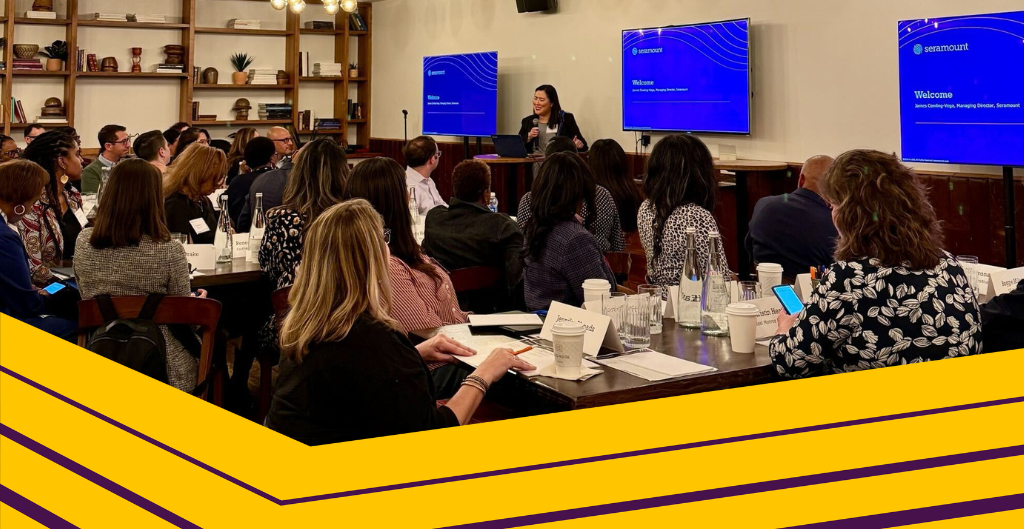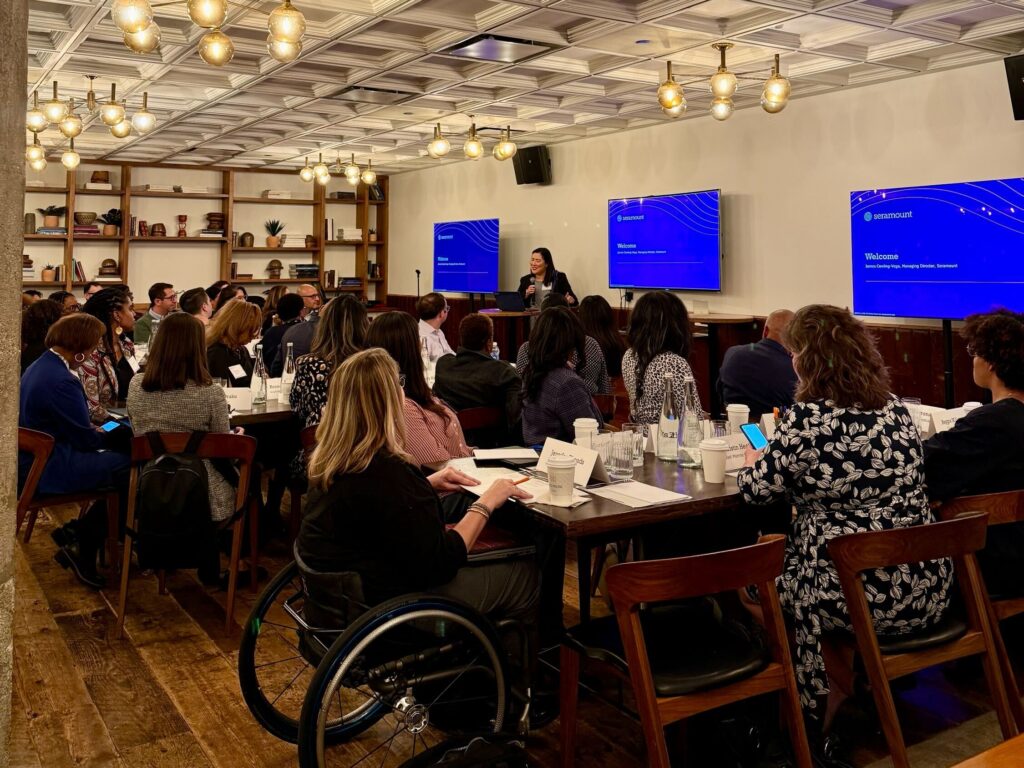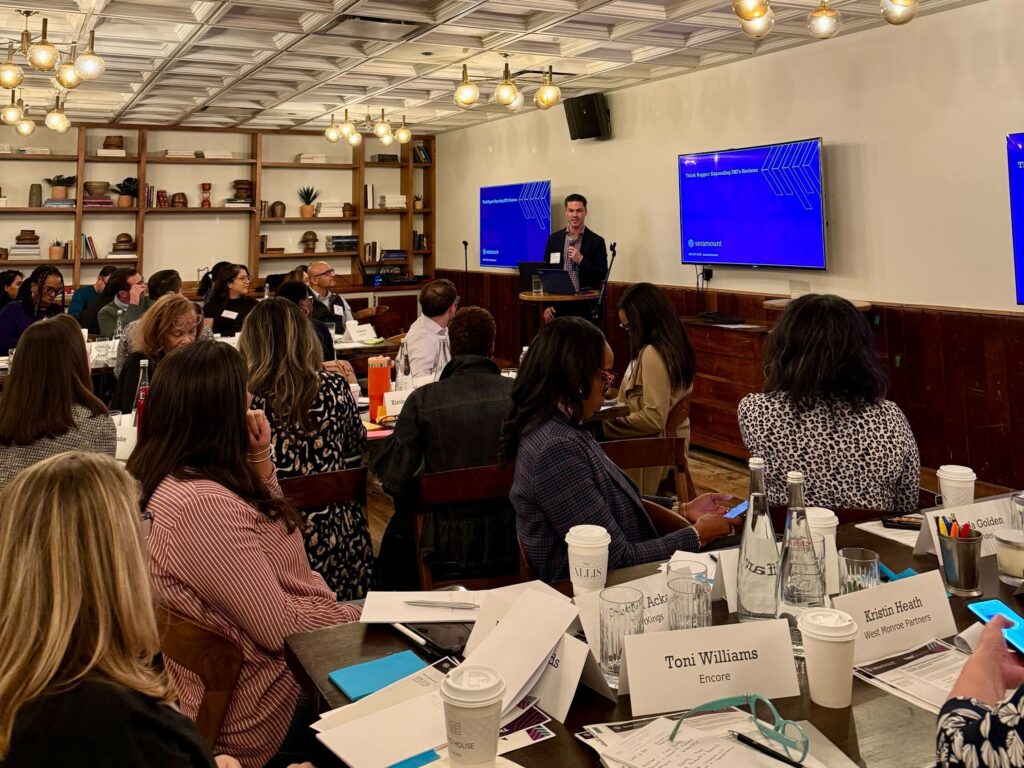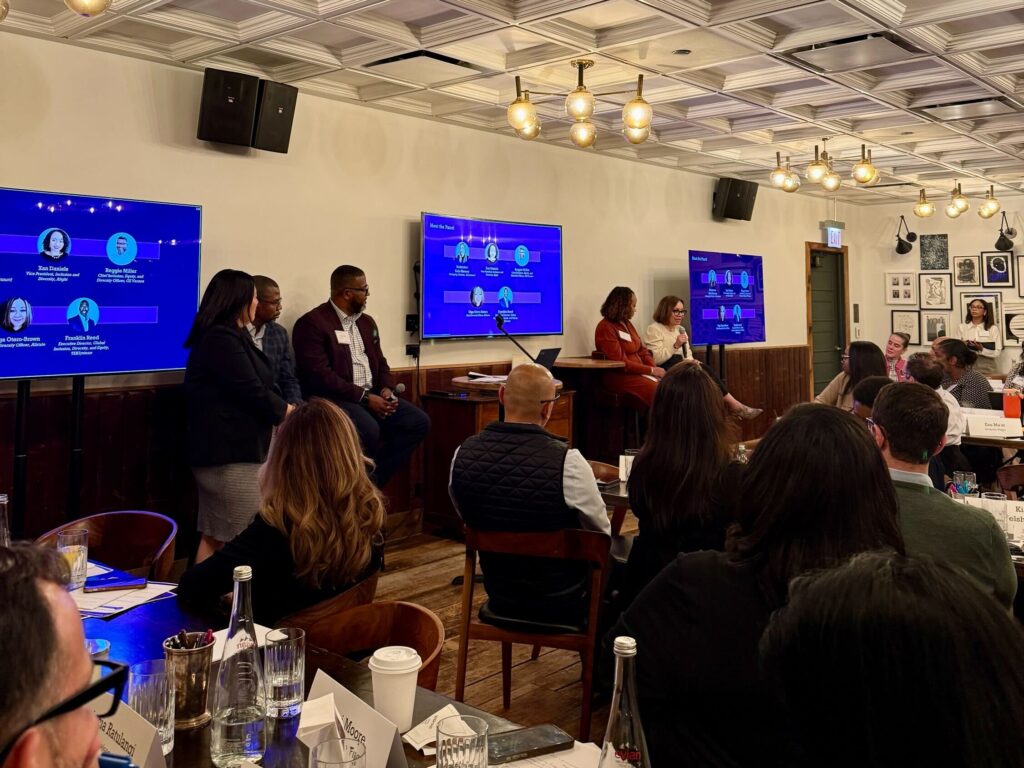Markese Redding is a a Senior New Markets Partner Strategist, supporting HR leaders through strategic partnerships and growth initiatives. Markese earned both a BA and an MBA from Loyola University Maryland, where he was a dedicated Division I basketball player. His commitment to social justice began during college, where he was a founding member of Student Athletes for Social Justice and served as a member of the Patriot League Social Justice Coalition and Black Student Association (BSA).
Now residing in New York City, Markese spends his free time coaching high school basketball and empowering underprivileged youth.
Think Bigger, Act Broader: Strategies for DEI’s Role in a Transforming World

At our recent Executive Roundtable, Think Bigger: The Role, Impact, and Potential of DEI in a Turbulent Global Environment, held at Soho House, Chicago, Seramount convened over 60 DEI and HR leaders across industries to discuss strategies to expand DEI’s scope, connect with multicultural consumers and diverse stakeholders, and drive bottom-line impact in a rapidly diversifying marketplace. Given the significant demographic shift, both in the US and globally, staying true to our DEI commitments has never been more important. Still, organizations need to innovate, evolve, reframe, and expand their approach in these polarizing times.

Katie Oertli Mooney, Managing Director at Seramount, emphasized this need for adaptability in her opening remarks, highlighting the need for connectivity among DEI leaders amid a volatile economic and political landscape. Mooney encouraged attendees to broaden DEI’s narrative beyond talent to include customers, consumers, suppliers, vendors, and community stakeholders, and to engage everyone—especially the “moveable middle”—in creating a more inclusive, impactful world. Only then can DEI not only survive but thrive and continue to grow from a moment to a movement in the face of backlash.
Let’s explore some of the other powerful takeaways from the day’s lively discussions.
Think Bigger – Expanding DEI’s Horizons
In his session, Dr. Michael Nicholson (Principal, Strategic Research at Seramount) prompted the audience with a bold question: “How do we think bigger about DEI?” Responses from participants underscored the value of embedding DEI as a core principle rather than treating it as a standalone initiative. They agreed that a DEI perspective is essential across all business functions and that organizations must “stay the course” despite challenges. “Humanity is the core of it all,” one participant remarked, highlighting the need for leaders to approach DEI with empathy, courage, and personal connection, especially in the face of resistance.
However, staying the course also needs to be combined with innovation and evolution. The discussion emphasized that DEI is a shared responsibility and should be positioned as a driver of business. Nicholson presented data from Seramount’s research revealing that DEI is foundational for shaping a future-ready business model, especially in light of changing demographics. Research showed that 42% of consumers actively choose companies with DEI commitments, while 65% feel businesses still lack alignment with diverse preferences. With Black, Latin, and Asian consumers projected to grow by over 2 million annually, companies must act on these shifts to avoid being left behind.
Source: U.S Census Bureau, Google, HBR
Nicholson’s data, supported by case studies from leading brands such as Microsoft, MedStar, and Wells Fargo, illustrated how DEI-driven strategies foster consumer loyalty, innovation, and positive financial results. Whether through developing bias-free AI, building inclusive customer experiences, or embracing supplier diversity practices, Nicholson’s research underscored a critical message: to stay relevant, organizations must not only embrace diversity in their internal operations but actively commit to DEI as a strategic priority in their external business.
Think Bigger: Reimagining DEI’s Impact

Michael Muñoz, Global Marketing DEI Lead at Google, shared insights on reframing DEI for greater impact. He spoke of his vision of a future where DEI is so integral to business operations that his role would eventually become obsolete, signaling a world where DEI is seamlessly integrated. Muñoz encouraged DEI professionals to shift from being “rockstars” to “scaffold builders,” creating structures that support diversity across the organization. This framework enables DEI to flourish independently within each team, even when dedicated DEI representatives aren’t in the room.
Muñoz’s message was clear: fostering genuine inclusivity requires building supportive structures that empower all individuals, enhancing both internal culture and positioning companies for success in an increasingly diverse market. He underscored the importance of valuing “culture adds” over “culture fits,” and crafting products that authentically serve diverse consumers. Embracing this commitment will ultimately lead to a more equitable future where everyone can thrive.
“Build scaffolding around your organization, and as teams develop their own support systems, they will begin to stand independently.”
Michael Muñoz, Global Marketing DEI Lead at Google
Think Bigger: DEI and the Bottom Line
Esu Ma’at, Chief DEI Officer for the Orlando Magic, discussed the impact of shifting demographics on talent and the broader market. Ma’at emphasized the tantalizing opportunity for sports organizations to grow market share by tapping into more diverse customer bases. “The fan base of yesterday is not the fan base of tomorrow.”
With Orlando’s population now over 60% BIPOC, a millennial boomtown, and its status as the fourth-largest LGBT market, the Orlando Magic has embraced this diversity, leveraging initiatives like Divine Nine Night and Pride Night to not only drive inclusion but also enhance revenue. Ma’at emphasized that diversity, when woven into market strategy, yields tangible benefits, making the DEI team a revenue driver rather than a cost center.
“Diversity does not equal poverty”
Esu Ma’at, Chief DEI Officer, the Orlando Magic,
For Ma’at, DEI must be embraced and executed by everyone—from leadership to frontline staff—to effectively reach diverse audiences and meet evolving market demands. He stressed that pushing DEI forward requires dedication and resilience, urging attendees to stay the course to the mission of expanding DEI’s narrative and impact.
Think Bigger, Think Global
James Cowling-Vega, Managing Director at Seramount, offered insights into the different dimensions of Global DEI, applicable to even those without a global footprint.
- Creating a global DEI strategy at multinational organizations
- Navigating regional differences, even within the same country
- Embedding DEI into global operations and business development
- Fostering cultural competence at home
- Learning from international best practices
Central to Cowling-Vega’s approach is the idea of balancing corporate values with local norms, especially when these diverge. For instance, Alight’s recognition of Juneteenth as a global day of social justice exemplifies how a universal DEI commitment can honor local significance, encouraging organizations to build a globally relevant, locally respectful DEI culture. This same framework can be applied regionally in states with differing stances on social issues, tailoring DEI efforts to fit both regional laws and corporate principles is essential for maintaining meaningful inclusivity.
Ultimately, Cowling-Vega urged organizations to adopt a more expansive, globally minded approach to DEI, integrating it into every facet of the business, even for companies without an apparent global footprint. This might mean training frontline employees to engage inclusively with diverse customer bases or collaborating with marketing teams as they enter new markets to ensure that messaging and products resonate culturally. By embracing this holistic and globally aware strategy, organizations can foster true inclusivity and drive sustainable progress in an increasingly interconnected world.
“In 2023, the foreign-born population in the US reached a record 47.8 million (14.3% of the total population).”
Source: Pew Research Center
CDO Panel: The Future of DEI

The event concluded with a panel featuring Reggie Miller (GE Vernova), Xan Daniels (Alight), Olga Otero Brown (Allstate), and Franklin Reed (TEK Systems). These DEI leaders shared insights on embedding DEI across every business facet, emphasizing the importance of collective responsibility. They underscored that accountability for DEI must extend beyond DEI departments to the entire C-suite, especially the CEO and CHRO, ensuring DEI is interwoven into the organizational fabric.
Panelists emphasized understanding the full business cycle and engaging with all aspects to drive change. Miller highlighted the importance of visibility and collaboration, connecting DEI with broader business goals. Collaboration within supportive communities enables DEI professionals to overcome the challenges of this work, which can sometimes feel isolating. Surrounded by like-minded peers, leaders find the motivation to continue advancing meaningful change.
Closing Remarks
Seramount encourages organizations to “Think Bigger” about DEI’s potential. As leaders, our focus must go beyond responding to today’s challenges—we’re called to innovate and cultivate sustainable, inclusive progress. DEI isn’t limited to our workplaces; it’s a transformative force that impacts entire industries, global markets, and diverse communities. Through continuous communication, strategic collaboration, and purposeful action, we can harness DEI’s full power to reshape not just our organizations but the world around us.
Ready to help your organization think bigger about DEI? Explore our latest research, The Executive Playbook for Expanding the Impact of DEI, for actionable strategies to get started.




